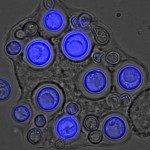Lien vers Pubmed [PMID] – 21508150
J. Clin. Microbiol. 2011 Jun;49(6):2191-5
A cytochrome b (cytb) gene quantitative PCR (qPCR) assay was developed to diagnose malaria in travelers. First, manual and automated DNA extractions were compared and automated DNA extraction of 400 μl of blood was found to be more efficient. Sensitivity was estimated using the WHO international standard for Plasmodium falciparum DNA and compared to that of a previously published qPCR targeting the 18S rRNA coding gene (18S qPCR). The limit of detection of the cytb qPCR assay was 20 DNA copies (i.e., 1 parasite equivalent) per 400 μl of extracted whole blood and was comparable for the two qPCR assays. Both qPCR assays were used on blood samples from 265 consecutive patients seen for suspicion of malaria. There were no microscopy-positive and qPCR-negative samples. Positive cytb qPCR results were observed for 51 samples, and all but 1 were also 18S qPCR positive. Eight (16%) of these 51 samples were negative by microscopic examination. The 8 cytb qPCR-positive and microscopy-negative samples were from African patients, 3 of whom had received antimalarial drugs. Three non-P. falciparum infections were correctly identified using an additional qPCR assay. The absence of PCR inhibitors was tested for by the use of an internal control of mouse DNA to allow reliable quantification of circulating DNA. The high analytical sensitivity of both qPCR assays combined with automated DNA extraction supports its use as a laboratory tool for diagnosis and parasitemia determination in emergencies. Whether to treat qPCR-positive and microscopy-negative patients remains to be determined.

